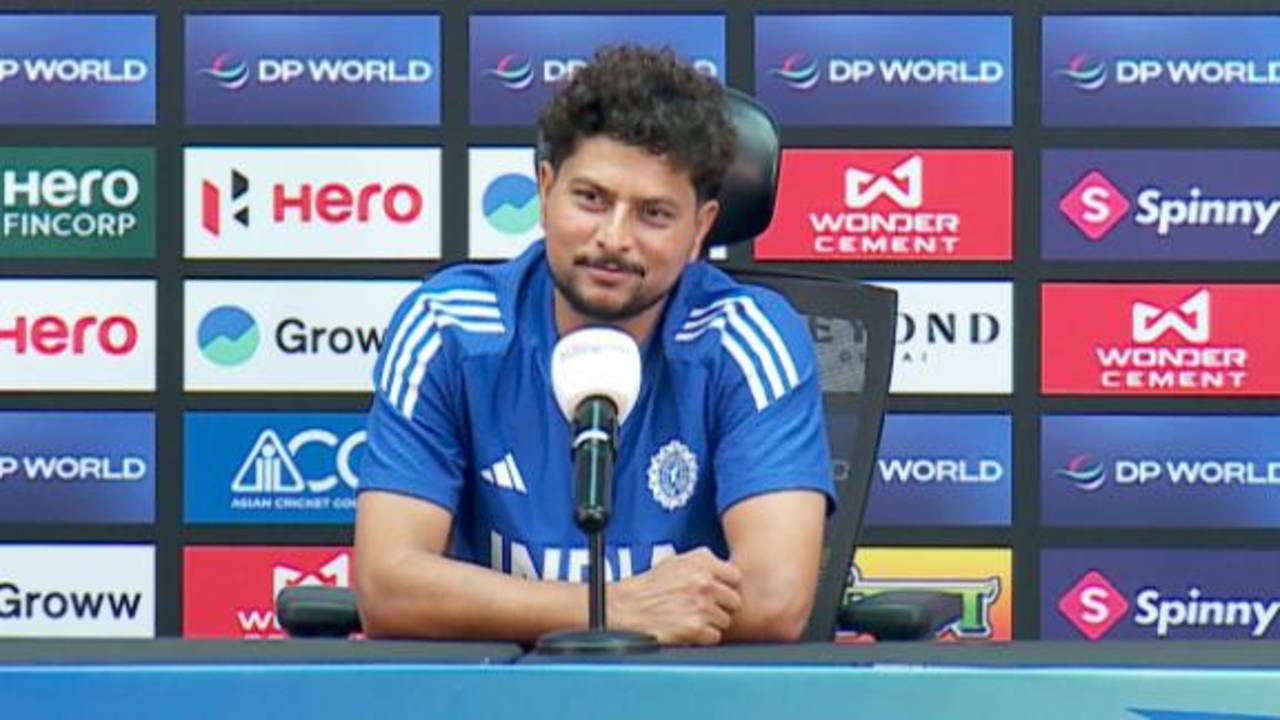Kuldeep: 'You learn a lot when you don't play'
"When you don't play, it is very easy to blame someone. To take it constructively and improve is tough"
Shashank Kishore
18-Sep-2025
For Kuldeep Yadav, rhythm is everything. It's what aids his drift, helps develop a loop to deceive batters in the air, and gives him confidence to sequence his deliveries better.
However, he says, rhythm only comes with time in the middle, something he didn't have a lot of through the course of an entire Test series in England, because the team opted for batting depth.
"In England, obviously, looking at the conditions and the combination of the team, I didn't get a place in the XI," he said ahead of India's final group match against Oman in Abu Dhabi in the Asia Cup. "But it was a very good time for me to work on myself, to improve my fitness and to give more volume to bowling, because it is very important."
Instead of sitting and sulking, Kuldeep developed his own pattern to training, and analysed his game, and picked out certain markers for when his time would come.
"As a player, you learn a lot when you don't play," he said. "When the team reacts to certain situations, you can judge from the outside. You have a lot of ideas when you are in this situation, as to how to react and how you can bowl. I got a lot of ideas from there.
"The communication [when he didn't play] from Gauti [head coach Gautam Gambhir] was very clear. He was very straightforward. When you don't play, it is very easy to blame someone. To take it constructively and improve is tough. There are two ways and players choose according to themselves.
"But it is very important that you keep working hard. The game is such that you have good and bad days. If you are not playing, you have time to improve on your own and become a better player when you get the chance."

Kuldeep Yadav did not get to play in England•Getty Images
Kuldeep's opportunity came soon after, in the form of a Duleep Trophy game in August. The scorecard will show no wickets next to his name, but for Kuldeep, those 32 overs meant so much more.
"It was very important for me to bowl there," he said. "Bowling in nets and bowling in a match are very different. Obviously, you want to play after a long time. You want to perform well. But I didn't have that much in my mind. I focused on my strength and tried to bowl in good areas."
Now, he feels that sense of rhythm has returned fully at the Asia Cup, where he has picked up seven wickets in two games, against UAE and Pakistan, across 37 deliveries.
"Actually, my rhythm is set now," he said. "I don't have a problem with that. I think it is important to use small angles for bowlers. As a wristspinner, I always think about my release point, my finish, whether the body is transferring [weight forward] or not.
"Between me, Varun and Axar, we are very experienced in the T20 format and understand our roles very well"
"When you don't play, these things run in your mind. But obviously, with the help of video analysis, you get an idea of how you are bowling. I think my rhythm is good now. In the beginning, when I changed [in 2022, he worked on a straighter run-up and went through the crease faster], it took time. But now I am used to it."
The rhythm and confidence tie in nicely to his spin chemistry with Varun Chakravarthy and Axar Patel in India's T20I set-up, with all three having different roles.
"Everyone knows their job and my job is to take wickets in the middle overs," Kuldeep said. "Axar, obviously, we have seen him bowling in the powerplay and he did the controlling job for us. Between me, Varun and Axar, we are very experienced in the T20 format and understand our roles very well.
"Giving a lot of inputs really helped me, or anyone who is bowling in the middle. Whether it is Axar or Varun or me, whoever bowls first assesses the conditions and then suggests something. So it's a good combination and we are very happy with that."

Axar Patel and Kuldeep Yadav ran through Pakistan's middle order•AFP/Getty Images
While Kuldeep's rhythm has given him a fresh verve on the field, he also consciously tries to find a balance off the field, something he believes helps him find a release, especially when he is not playing. That balance has come through football.
"If you follow other sports, you get to know how it feels when a team is performing really well," he said. "You see the bench strength of their team. They have some unbeatable bench strength and when you focus on them, they are not getting enough time -15 minutes, 20 minutes - but they are so good, they can start in any game.
"You see other teams, especially the big ones, and how they play against smaller teams - the communication, the decision-making, how quickly it all happens. You hardly have enough time to react.
"Obviously, I play cricket on the field, that's my job. After that, I enjoy football. There are so many games, you just watch and enjoy. In any sport, you admire how they play, especially in team games. The communication, the connection between players, how they lift each other - that's the most important thing."
Shashank Kishore is a senior correspondent at ESPNcricinfo
